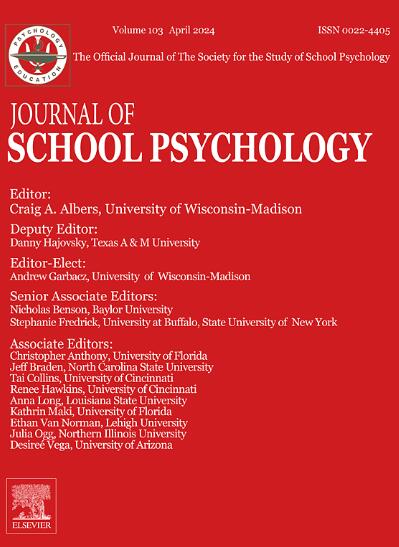Supporting healthy development in adolescence: Technology-supported cooperative learning can reduce stress and increase sleep quality
IF 4.1
1区 心理学
Q1 PSYCHOLOGY, SOCIAL
引用次数: 0
Abstract
Peer relationships are a significant source of stress for adolescents that can negatively impact sleep quality. Cooperative learning can reduce adolescent stress by enhancing positive social interactions in school, which may improve adolescent sleep quality. This study evaluated (a) the effects of technology-assisted cooperative learning (i.e., PeerLearning.net) on adolescents' sleep quality, sleep duration, and sleep onset latency; (b) whether these effects were mediated by reductions in stress; and (c) whether effects were moderated by race and ethnicity, sex, grade level, and dosage. We conducted a cluster randomized trial with 12 middle and high schools in the Pacific Northwest (n = 6 intervention, n = 6 control) and collected two waves of data from a sample of 813 students (50.2% female, 70.7% White, US Grades 6–9, ages 12–16 years). Results indicated significantly reduced stress (R2 = 0.80) and increased perceived sleep quality (R2 = 0.47) among adolescents after implementing technology-assisted cooperative learning, including a significant effect for dosage, but no effects on sleep duration or sleep onset latency. Effects on perceived sleep quality were mediated by effects on stress. No moderation by sex, grade, or race/ethnicity was found. Our findings (and those from previous research) suggested that technology-assisted cooperative learning is a promising universal school-based prevention program that can impact a wide range of student (and teacher) outcomes.
支持青少年健康发展:技术支持的合作学习可以减轻压力,提高睡眠质量
同伴关系是青少年压力的重要来源,会对睡眠质量产生负面影响。合作学习可以通过加强学校的积极社会互动来减轻青少年的压力,这可能会改善青少年的睡眠质量。本研究评估了(a)技术辅助合作学习(即PeerLearning.net)对青少年睡眠质量、睡眠持续时间和睡眠发作潜伏期的影响;(b)这些影响是否由压力减轻所介导;(c)影响是否被种族、民族、性别、年级水平和剂量所缓和。我们在太平洋西北地区的12所初中和高中进行了一项集群随机试验(n = 6干预,n = 6对照),并从813名学生(50.2%女性,70.7%白人,美国6 - 9年级,12 - 16岁)的样本中收集了两波数据。结果表明,在实施技术辅助合作学习后,青少年的压力显著降低(R2 = 0.80),感知睡眠质量显著提高(R2 = 0.47),包括剂量的显著影响,但对睡眠持续时间和睡眠发作潜伏期没有影响。对感知睡眠质量的影响是通过对压力的影响介导的。没有发现性别、年级或种族/民族的调节作用。我们的研究结果(以及以前的研究结果)表明,技术辅助的合作学习是一种很有前途的、普遍的以学校为基础的预防项目,可以影响广泛的学生(和教师)的成果。
本文章由计算机程序翻译,如有差异,请以英文原文为准。
求助全文
约1分钟内获得全文
求助全文
来源期刊

Journal of School Psychology
PSYCHOLOGY, EDUCATIONAL-
CiteScore
6.70
自引率
8.00%
发文量
71
期刊介绍:
The Journal of School Psychology publishes original empirical articles and critical reviews of the literature on research and practices relevant to psychological and behavioral processes in school settings. JSP presents research on intervention mechanisms and approaches; schooling effects on the development of social, cognitive, mental-health, and achievement-related outcomes; assessment; and consultation. Submissions from a variety of disciplines are encouraged. All manuscripts are read by the Editor and one or more editorial consultants with the intent of providing appropriate and constructive written reviews.
 求助内容:
求助内容: 应助结果提醒方式:
应助结果提醒方式:


